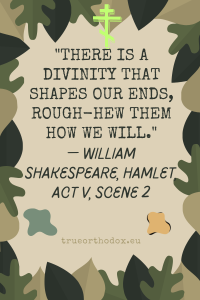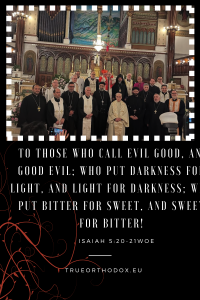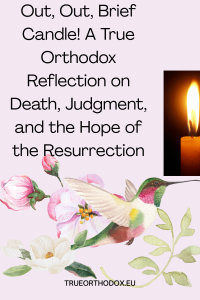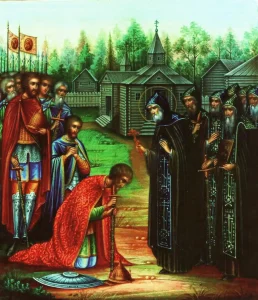Noah’s Flood
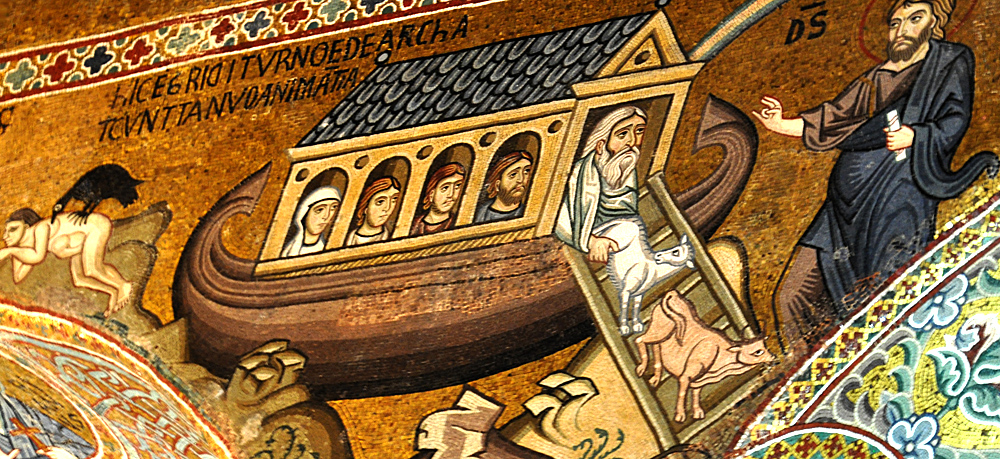
Noah and the Rainbow
by Dr. Vladimir Moss
Just as sin multiplied in the prediluvial world, so did its punishment. The Flood came and destroyed the whole of humanity and animal life with the exception of Noah and his sons and those who entered with them into the Ark. And Paradise, which before had been at least visible from the earth, was taken completely away from it…

The Cainites eventually became the overwhelming majority of mankind, and the first-century Jewish historian Flavius Josephus writes that they corrupted even most of the Sethites: “This posterity of Seth continued to esteem God as the Lord of the universe, and to have an entire regard to virtue, for seven generations; but in process of time they were perverted… But Noah was very uneasy at what they did, and being displeased at their conduct, persuaded them to change their disposition, and their actions for the better: but seeing they did not yield to him, but were slaves to wicked pleasures, he was afraid they would kill him, together with his wife and children, and those they had married; so he departed out of the land.”
Since cities were built soon after the fall of man, we must presume that there was some kind of political organization in the antediluvial world. Archaeological research carried out in the last few decades at Varna in Bulgaria and Tell-Hamoukar in Syria has discovered remains of urban civilizations of the fifth and fourth millennia BC (i.e. older than the Flood) with evidence of social stratification.
In this period, the earth was filled with sin and criminality, and the Holy Spirit departed from men (Genesis 6.3). So God decided to wipe out human civilization, the civilization of Cain, and even the whole of the animal kingdom, and start again. Hence the Flood of Noah, a universal catastrophe that destroyed all life except Noah and his family and the animals that were with him in the Ark, who represent the Church that survives the destruction of the world.
So Statehood in its first historical examples was antichristian and was destroyed by the just judgement of God.
Archbishop Andrew of Rockland writes of Noah: “It was revealed to him by God that there would be a world-wide flood which would destroy all those who remained in ungodliness. But for the salvation of those who would remain in godliness, those who still preserved all that is God’s in honor, God commanded Noah to build an ark. And Noah began to build an ark, and at the same time to call the people to repentance.
“But the sky was clear, not a cloud; the whole of nature, as if indifferent to the sins of men, remained solemnly silent. Men heard Noah, but shrugged their shoulders and went away. The building of the ark was finished, but only the family of Noah entered it. They entered the ark, not yet to escape the flood, but to escape the ungodliness which was everywhere… And finally, the rain came; the water began to rise and inundate everything. Now the frightened people hastened to the ark, but the doors closed by themselves, and no one else was able to enter…”
The historicity of the Flood was witnessed by the Lord Himself and the Apostle Peter (Matthew 28.38-39; II Peter 3.5-6), as well as by the folklore of almost all human races. Recent archaeological research has discovered the Ark itself in the mountains of eastern Turkey. After many false sightings, this seems to be the genuine Ark.
According to the Greek Septuagint text of the Bible, the oldest Biblical text and the only one officially recognized by the Holy Fathers of the Orthodox Church, the world was created in 5508 BC, and the Flood took place in 3289 BC. It covered the whole earth. Only one part of the globe remained untouched – Paradise. For as St. Ephraim the Syrian wrote:
With the eye of my mind
I gazed upon Paradise.
The summit of every mountain
Is lower than its summit;
The crest of the flood
Reached only its foothills,
These it kissed with reverence
Before turning back
To rise above and subdue the peak
Of every hill and mountain.
The foothills of Paradise it kisses,
While every summit it buffets.
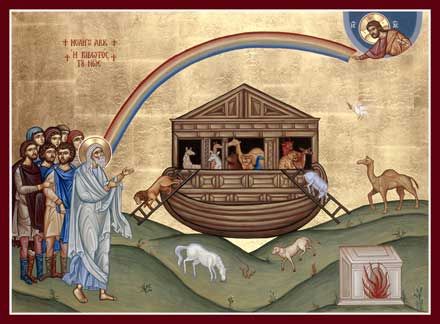
The Flood, combined with the volcanic eruptions that accompanied it, altered the climate and geography of the earth, making fossils of the animals that were killed by it. Spreading south from the mountains of Ararat, where the ark came to rest, Noah’s descendants came to Sumeria (Iraq), and built the world’s first postdiluvial civilization.
*
Immediately after the flood, Noah offered a sacrifice to God of all the clean beasts that entered with him into the ark. For God accepts as sacrifices in the Church only those whose lives have been cleansed by repentance. “Then [that is, after repentance and purification] shalt Thou be pleased with a sacrifice of righteousness, with oblation and whole-burnt offerings” (Psalm 50.19).
In return, God blessed Noah and his sons and established a covenant with him whereby He promised never to destroy the earth again by a flood. “And God said, This is the token of the covenant which I make between me and you and every living creature that is with you, for perpetual generations: I do set My bow in the cloud, and it shall be for a token of a covenant between Me and the earth…” (Genesis 9.12-13) St. Victorinus of Petau wrote: “The rainbow is called a bow from what the Lord spoke to Noah and to his sons, that they should not fear any further deluge in the generation of God, but fire. For thus He says: ‘I will place my bow in the clouds, that you may now no longer fear water, but fire.’”
A judgement of fire came quite soon, with the destruction of Sodom and Gomorrah; but the main reference here is to the judgement and cleansing by fire that will come upon the whole world at the end of time (II Peter 3.10-12). This is the first of many Old Testament covenants between God and the people of God, but the last that relates to the whole of mankind, irrespective of their faith or lack of it. For the flood was a judgement inflicted on the whole of mankind when it was not yet divided into different nations and languages.
God then commanded Noah to establish a system of justice that is the embryo of statehood as it should be: “The blood of your lives will I require: at the hand of every beast will I require it, and at the hand of man; at the hand of every man’s brother will I require the life of man. Whoso sheddeth man’s blood, by man shall his blood be shed: for in the image of God made He man” (Genesis 9.5-6).
Commenting on these words, Protopriest Basil Boshchansky writes that they “give the blessing of God to that institution which appeared in defense of human life” – that is, the State.
“The word ‘require’ is a judicial term, God appearing as a judge who exacts a strict and severe penalty for infraction of a sacred law. If a beast kills a man, the beast must be put to death (note also Exodus 21.28). If a man kills another man (wilfully and culpably, it is assumed), then he also must be put to death by ‘every man’s brother’. This latter phrase is not intended to initiate family revenge slayings, of course, but rather to stress that all men are responsible to see that this justice is executed. At the time these words were first spoken, all men indeed were blood brothers; for only the three sons of Noah were living at the time, other than Noah himself. Since all future people would be descended from these three men and their wives, in a very real sense all men are brothers, because all were once in the loins of these three brothers. This is in essence a command to establish a formal system of human government, in order to assure that justice is carried out, especially in the case of murder. The authority to execute this judgement of God on a murderer was thus delegated to man.”
But not to every man. The authority to judge can only be given to one whom God has appointed to judge – that is, to rulers. We see this in the story of Moses, who went out and saw two Hebrews quarreling. He said to the one who did the wrong, “Why are you striking your companion?”, who replied: “Who made you a prince and a judge over us?” (Exodus 2.13-14). And indeed, Moses had not at that time received the power to judge Israel. Only when he had fled into the wilderness and been given power by the true King of Israel, the God of Abraham, Isaac, and Jacob, was he accepted by the Israelites as having true authority. Only then was he able to deliver his people from Pharaoh, who was imposing his despotic rule over then…
As the revolutionary-turned-monarchist Lev Alexandrovich Tikhomirov writes, the idea that “the state is ‘the monopoly of violence’ completely coincides with the Christian attitude to the state. The complete removal of violence from private right and its exclusive concentration in the hands of the state means that violence in personal interests is unconditionally removed and forbidden. But it is allowed only in those hands in which there is in principle no personal interest, but only the interest of justice. With the monopolization of violence in the hands of the state violence is released only to support justice.”
That is why political authority as such and in principle is good and established by God: “there is no authority that is not from God” (Romans 13.1). This is true especially of the political leaders of the people of God, for whom the Lord established a special sacrament, the anointing to the kingdom: “I have found David My servant, with My holy oil have I anointed him” (Psalm 88.19). Even certain pagan kings were given an invisible anointing to enable them to rule justly and help the people of God, such as Cyrus of Persia (Isaiah 45.1).
*
The Flood marked a new beginning for the human race, a foreshadowing of the baptism by water and the Spirit that marks the spiritual rebirth of the human race in the New Testament Church (I Peter 3.19-20). From Noah and his three sons, Shem, Ham, and Japheth and their wives came all the nations of man. Shem became the father of the Semitic races, the Jews and the Arabs. Japheth became the father of the Gentile races (Indo-Europeans and others). Ham became the father of the African races.
Noah prophesied: “Blessed be the Lord, the God of Shem, and may Canaan [Ham’s son] be his servant. May God enlarge Japheth, and may he dwell in the tents of Shem; and may Canaan be his servant” (Genesis 9.26-27). “The God of Shem” was the Lord Jesus Christ, and the Church of Christ was indeed formed from the remnant of faithful Jews. Japheth was indeed “enlarged” – his descendants became the most numerous of the three branches of mankind. Japheth “dwelt in the tents of Shem” in that very many of the Gentiles, the descendants of Japheth, joined the Church, the new Jews and the “tent” of the people of God, whether Jewish or Gentile, who believe in Christ.
and purification] shalt Thou be pleased with a sacrifice of righteousness, with oblation and whole-burnt offerings” (Psalm 50.19).In return, God blessed Noah and his sons, and established a covenant with himwhereby He promised never to destroy the earth again by a flood. “And God said,This is the token of the covenant which I make between me and you and every livingcreature that is with you, for perpetual generations: I do set My bow in the cloud,and it shall be for a token of a covenant between Me and the earth…” (Genesis 9.12-13) St. Victorinus of Petau wrote: “The rainbow is called a bow from what the Lordspoke to Noah and to his sons, that they should not fear any further deluge in thegeneration of God, but fire. For thus He says: ‘I will place my bow in the clouds, thatyou may now no longer fear water, but fire.’”8 A judgement of fire came quite soon, with the destruction of Sodom andGomorrah; but the main reference here is to the judgement and cleansing by fire thatwill come upon the whole world at the end of time (II Peter 3.10-12). This is the firstof many Old Testament covenants between God and the people of God, but the lastthat relates to thewhole of mankind, irrespective of their faith or lack of it. For theflood was a judgement inflicted on the whole of mankind when it was not yetdivided into different nations and languages.God then commanded Noah to establish a system of justice that is the embryo ofstatehood as it should be: “The blood of your lives will I require: at the hand of everybeast will I require it, and at the hand of man; at the hand of every man’s brotherwill I require the life of man. Whoso sheddeth man’s blood, by man shall his bloodbe shed: for in the image of God made He man” (Genesis 9.5-6).Commenting on these words, Protopriest Basil Boshchansky writes that they“give the blessing of God to that institution which appeared in defence of humanlife” – that is, the State.9 “The word ‘require’ is a judicial term, God appearing as a judge who exacts astrict and severe penalty for infraction of a sacred law. If a beast kills a man, thebeast must be put to death (note also Exodus 21.28). If a man kills another man(wilfully and culpably, it is assumed), then he also must be put to death by ‘everyman’s brother’. This latter phrase is not intended to initiate family revenge slayings,of course, but rather to stress that all men are responsible to see that this justice isexecuted. At the time these words were first spoken, all men indeed were blood brothers; for only the three sons of Noah were living at the time, other than Noahhimself. Since all future people would be descended from these three men and their wives, in a very real sense all men are brothers, because all were once in the loins of these three brothers. This is in essence a command to establish a formal system of human government, in order to assure that justice is carried out, especially in the8 St. Victorinus,Commentary on the Apocalypse.9 Boshchansky, “Zhizn’ vo Khriste” (“Life in Christ”), inTserkovnaia Zhizn’(Church Life), NN 3-4, May-August, 1998, p. 41.
case of murder. The authority to execute this judgement of God on a murderer was thus delegated to man.”10 But not to every man. The authority to judge can only be given to one whom God has appointed to judge – that is, to rulers. We see this in the story of Moses, who went out and saw two Hebrews quarreling. He said to the one who did the wrong,“Why are you striking your companion?”, who replied: “Who made you a princeand a judge over us?” (Exodus 2.13-14). And indeed, Moses had not at that timereceived the power to judge Israel. Only when he had fled into the wilderness andbeen given power by the true King of Israel, the God of Abraham, Isaac and Jacob,was he accepted by the Israelites as having true authority. Only then was he able todeliver his people from Pharaoh, who was imposing his despotic rule over then…11 As the revolutionary-turned-monarchist Lev Alexandrovich Tikhomirov writes,the idea that “the state is ‘the monopoly of violence’ completely coincides with theChristian attitude to the state. The complete removal of violence from private rightand its exclusive concentration in the hands of the state means that violence inpersonal interests is unconditionally removed and forbidden. But it is allowed onlyin those hands in which there is in principle no personal interest, but only theinterest of justice. With the monopolization of violence in the hands of the stateviolence is released only to support justice.”12 That is why political authorityas such and in principle is good and established byGod: “there is no authority that is not from God” (Romans 13.1). This is trueespecially of the political leaders of the people of God, for whom the Lordestablished a special sacrament, the anointing to the kingdom: “I have found DavidMy servant, with My holy oil have I anointed him” (Psalm 88.19). Even certainpagan kings were given an invisible anointing to enable them to rule justly and helpthe people of God, such as Cyrus of Persia (Isaiah 45.1).* The Flood marked a new beginning for the human race, a foreshadowing of thebaptism by water and the Spirit that marks the spiritual rebirth of the human race inthe New Testament Church (I Peter 3.19-20). From Noah and his three sons, Shem,Ham and Japheth and their wives came all the nations of man. Shem became thefather of the Semitic races, the Jews and the Arabs. Japheth became the father of theGentile races (Indo-Europeans and others). Ham became the father of the Africanraces. Noah prophesied: “Blessed be the Lord, the God of Shem, and may Canaan[Ham’s son] be his servant. May God enlarge Japheth, and may he dwell in the tentsof Shem; and may Canaan be his servant” (Genesis 9.26-27). “The God of Shem” was10 Henry Morris,The Genesis Record, Grand Rapids, Mich.: Baker Book House, 1976, p. 224.11 E. Kholmogorov, “O Khristianskom tsarstve i ‘vooruzhennom narode’” (“On the Christian Kingdomand ‘the Armed People’”),Tserkovnost’(Churchness), N 1, 2000, pp. 35-38.12 Tikhomirov,Religioznie-philosophskie osnovy istorii(The Religio-Philosophical Foundations ofHistory), Moscow, 1997, p. 268.

